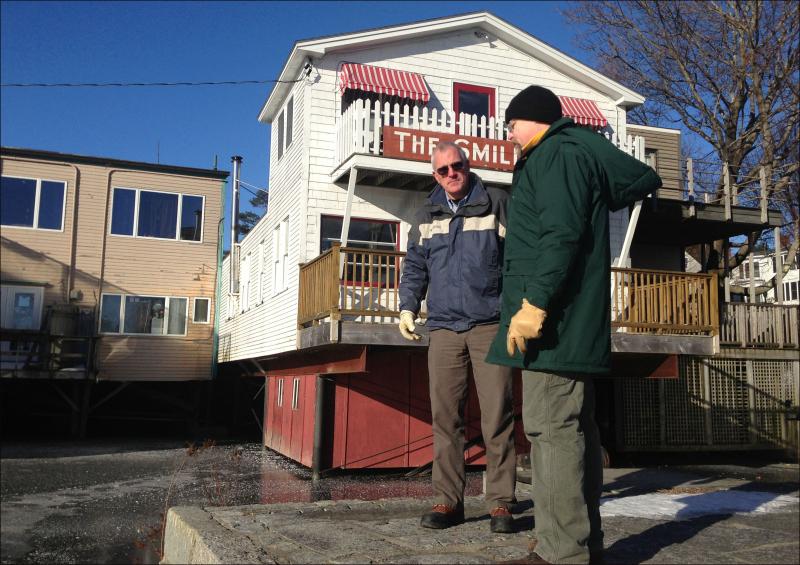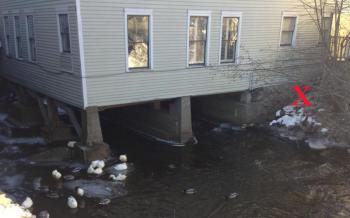Minor oil spill in Camden's Megunticook River; duck welfare a concern

CAMDEN — A malfunctioning oil burner at an inn on Tannery Lane in downtown Camden released a minor amount of fuel oil onto pavement and into the lower Megunticook River, just before the river empties into Camden Harbor. Dan Davis, an oil and hazardous waste specialist with the Maine Department of Environmental Protection, assessed the spill at 9 a.m., Jan. 24, and said he had few concerns about it, except for the welfare of a gaggle of ducks that were swimming near the spill site.
Davis called biologists with the Maine Department of Inland Fisheries and Wildlife for an opinion of whether the oil might harm the ducks. He was concerned that the fuel might disrupt the natural oils present in duck feathers, and in turn, cause hypothermia. A biologist arrived in Camden at noon, and with Davis, was down at the harbor assessing the ducks there.
"There seem to be no signs of impact or odd behavior," said Davis.
A Camden resident who feeds the ducks every morning detected the oil spill earlier in the day at approximately 7 a.m., as he stood on the pedestrian bridge.
"He may have seen the patch of red frozen ice by the bridge, and smelled the oil," said Camden Firefighter Cheyne Hansen.
The man called Camden Police Officer Curt Andrick, who responded and contacted Hansen. The two traced the source of the spill to an oil tank behind the Inn at Camden Place, which is tucked between Tannery Lane and Mechanic Street, and adjacent to the old Brewster Mill.
Hansen laid down absorbent pads and Speedy-Dry, which is like cat litter, to soak up the oil that was collecting on the narrow alley of pavement between buildings before draining down a steep dirt bank to the river.
Hansen also called the DEP, and Davis arrived, monitoring the situation with Ross Parker, Camden's waste water manager.
Davis estimated that approximately 20 gallons of No. 2 fuel oil had escaped from the oil tank system. The spill occured as the oil burner apparently was unable to properly balance the oil flow between three tanks. The system was pulling fuel from the tanks, and and then returning fuel to the front tank. Cold temperatures caused a more frequent demand on the system, and with the unit constantly running, the burner could not keep up with the flow of oil.
"The returning fuel was flowing faster than it could level itself out," said Hansen.
He contacted the building's caretaker, Zach Cohn, who called Maritime Energy, with repairmen arriving just after 8 a.m. to shut the system down.
By then, the oil leak had stopped on its own.
Davis walked down to the harbor with Parker, and concluded that as the oil would go over the dam it would break up and eventually evaporate. He told Parker that the small amount of spillage did not warrant sending responders into the water and risking their welfare.
"I don't want people to get hurt," he said.
However, the sheen on the water and the fact that the population of a dozen or so ducks in the river were swimmng in and out of the collecting oil was enough to prompt Davis to contact a biologist with Maine's Department of Inland Fisheries and Wildlife.
Davis said the oil (No. 2 is considered a light oil) in the river would eventually disperse, given time and depending on air and water temperatures. The more energy, or turbulence, in the water would break it up faster, and he was anticipating that the water descending over the waterfall into the harbor would create enough force to disperse the sheen and help the oil more quickly evaporate.
A Marine Patrol officer arrived in Camden at 11 a.m., assessed the harbor, and determined there was no environmental issue or likelihood of damage to the working waterfront.
Davis said at noon that he would be asking Parker to drop the level of the water in the river just a bit to help flush out any oil trapped under the ice along Tannery Lane and reduce chances for the ducks to get contaminated by residual oil.
Editorial Director Lynda Clancy can be reached at lyndaclancy@penbaypilot.com; 706-6657.


























